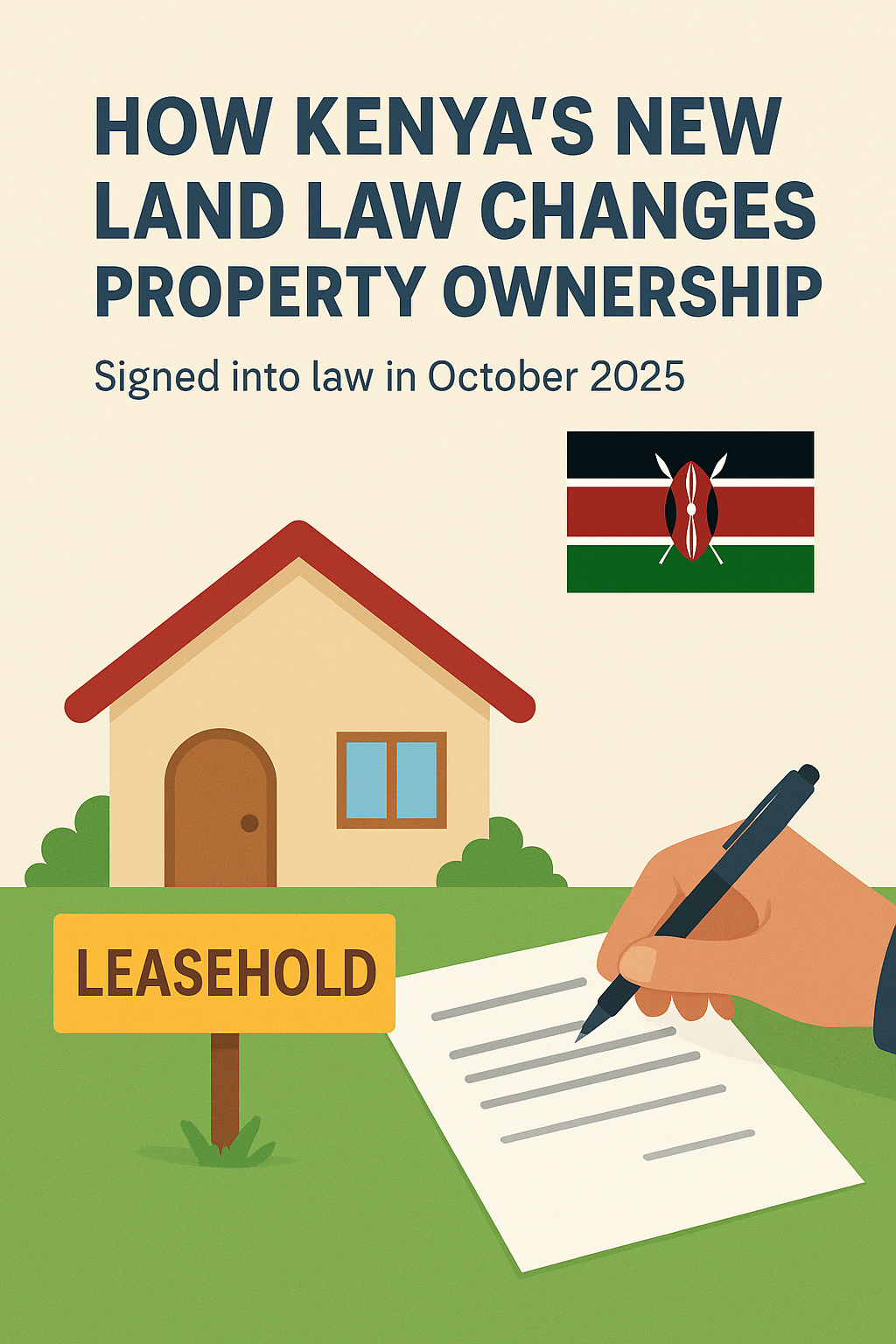Signed into law in October 2025, the Land (Amendment) Bill, 2024 marks one of the biggest shifts in property ownership Kenya has seen in decades. The law reshapes how land is held, managed, and transferred — with significant implications for every landowner, developer, and investor in the country.
So, what exactly has changed? And how might it affect your property or investment plans — especially along the Coast?
1️⃣ Freehold to Leasehold: A Major Shift in Tenure
One of the most talked-about changes is the conversion of freehold land to leasehold tenure.
Under the new framework, most land previously held under freehold ownership — meaning indefinite ownership — may now be converted to a 99-year leasehold from the State.
That means you’ll still have full control and ownership rights for nearly a century, but not forever. After the lease expires, the title reverts to the government unless renewed.
For property owners used to the security of freehold, this is a significant psychological and financial change. It alters how land can be inherited, developed, or used as collateral.
2️⃣ Annual Land Rent Introduced
To accompany the new leasehold system, the law introduces annual ground rent payable to the government.
Previously, freehold owners didn’t pay annual rent — only rates and taxes. Now, this new obligation means property owners must factor in ongoing costs for as long as they hold the land.
While details of the rent rates will be set through future regulations, this move aligns Kenya’s system with many other Commonwealth countries where leasehold is the standard tenure.
3️⃣ More Oversight and Stricter Land Registration
The law also gives the government greater powers to monitor, regulate, and approve land transactions.
Key updates include:
- All public land transactions must now be published in the Kenya Gazette before registration.
- More stringent verification processes for land transfers and subdivisions.
- Enhanced digital registration systems to curb fraud and duplicate titles.
For developers and land buyers, this could mean longer approval timelines — but also cleaner, more traceable land records.
4️⃣ Foreign Ownership Rules Reinforced
The new law reaffirms a long-standing principle:
Only Kenyan citizens can hold freehold land.
Foreign nationals and companies with foreign shareholders are limited to leasehold tenure of up to 99 years.
This restriction is not new, but the Ministry of Lands has signaled its intent to strictly enforce it, meaning any existing freehold titles held by foreigners could be reviewed or converted.
5️⃣ What It Means for Property Owners and Investors
If you already own land or are planning to buy property in Kenya, here’s what to keep in mind:
✅ Expect changes to your title.
Freehold titles may need to be converted to leasehold, so check your deed’s status and any notices from the Ministry of Lands.
✅ Factor in ongoing rent.
New annual payments could affect your property’s net returns or resale value.
✅ Prepare for a more regulated process.
Due diligence, title searches, and professional conveyancing will become even more important during transactions.
✅ Foreign investors: leasehold is the way forward.
Plan around 99-year leases and ensure your contracts clearly define renewal terms.
✅ Financing implications.
Banks and lenders may revise their approach to leasehold security, so consult your financier if you’re using property as collateral.
6️⃣ What’s Next?
Although the President has signed the law, its implementation will depend on official gazettement and detailed regulations from the Ministry of Lands. These will spell out how conversion, rent assessment, and renewals will work in practice.
Until then, there’s a transition period where landowners are advised to:
- Review their ownership documents.
- Engage registered surveyors and lawyers for clarity.
- Keep track of announcements from the National Land Commission and County Lands Offices.
🌅 The Bigger Picture
From an investor’s perspective, this reform aims to modernize Kenya’s land management, make taxation fairer, and enhance government oversight. But for individual property owners — especially in high-value areas like Malindi, Watamu, and Diani — the implications are deeply personal.
Your tenure, costs, and even long-term plans may change. The best move now is to stay informed, stay compliant, and seek professional advice before making big property decisions.
🏠 About Mkaazi Real Estate
At Mkaazi Real Estate Ltd, we help Kenyans and diaspora investors navigate the evolving real estate landscape — from property acquisitions and due diligence to marketing and sales.
Whether you’re buying, selling, or developing along the Coast, our team can help you make confident, informed decisions under the new legal framework.
📞 Talk to us today:
+254 724 56 8989
🌐 www.mkaazirealestate.co.ke
✉️ info@mkaazirealestate.co.ke


